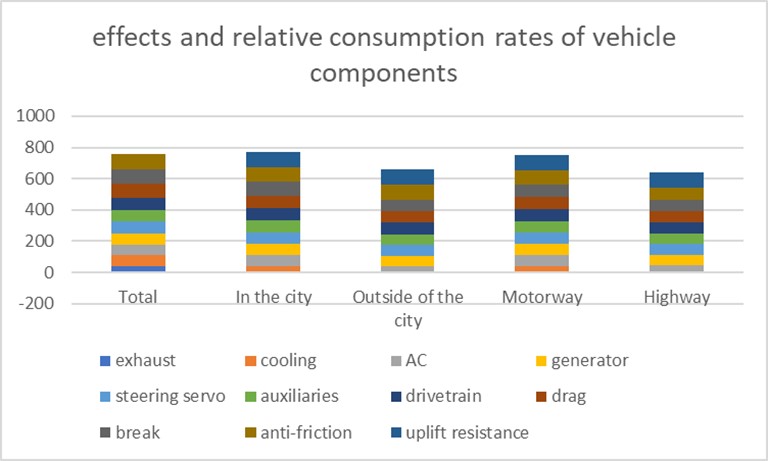Investigating energy management of hybrid vehicle technologies to promote sustainable mobility paradigms
Main Article Content
Abstract
Analysing contemporary passenger cars' energy consumption and environmental impacts is a critical research area. This is particularly relevant in urban transport's dynamic and unpredictable environment, where vehicles' fuel consumption and emissions vary considerably. An in-depth understanding of such fluctuations is essential for innovative, efficient, environmentally friendly vehicle technology. In the present research, I investigated a 1.4-litre petrol hybrid vehicle, focusing on its energy supply chain under real-world urban driving conditions. The study focuses on policies that can promote the development of sustainable mobility, improve energy efficiency and reduce environmental pollution. The results can help to optimise hybrid vehicle technologies in an environmentally conscious way and explore possible new avenues for sustainable transport solutions.
Article Details

This work is licensed under a Creative Commons Attribution-NonCommercial-ShareAlike 4.0 International License.
Authors retain copyright and grant the journal right of first publication with the work simultaneously licensed under a Creative Commons Attribution License that allows others to share the work with an acknowledgement of the work's authorship and initial publication in this journal.
Authors are able to enter into separate, additional contractual arrangements for the non-exclusive distribution of the journal's published version of the work (e.g., post it to an institutional repository or publish it in a book), with an acknowledgement of its initial publication in this journal.
Authors are permitted and encouraged to post their work online (e.g., in institutional repositories or on their website) prior to and during the submission process, as it can lead to productive exchanges, as well as earlier and greater citation of published work (See The Effect of Open Access). As soon as the paper is accepted, finally submitted and edited, the paper will appear in the "OnlineFirst" page of the journal, thus from this point no other internet-based publication is necessary.
References
Bortz, J. (2005). Statistik Human Sozialwissenschaftler 6th edition. Springer Verlag, Berlin.
Duhr, P., Christodoulou, G., Balerna, C., Salazar, M., Cerofolini, A., Onder, C. H. (2021). Time-optimal gearshift and energy management strategies for a hybrid electric race car. Applied Energy. 282, Part A. 115980. DOI: https://doi.org/mpk6
Hartlieb, S (2009).: Untersuchung von Fahrversuchsdaten auf demographisch signifikante Merkmale zur Identifikation von Fahrern und Situationen, Studienarbeit am Institut für Verbrennungsmotoren und Kraftfahrwesen, Universität Stuttgart, November 2009
Li, C., Xu, X., Zhu, H., Gan, J., Chen, Z., Tang, X. (2024). Research on car-following control and energy management strategy of hybrid electric vehicles in connected scene. Energy. 293, 130586. DOI: https://doi.org/mpk7
Meszaros, F., & Torok, A. (2014). Theoretical investigation of emission and delay based intersection controlling and synchronising in Budapest. Periodica Polytechnica Transportation Engineering, 42(1), 37-42. DOI: https://doi.org/mpk8
Tollner D., Zöldy M. (2023). Dynamic Data extraction from vehicles through OBD connector. 2023 IEEE 2nd International Conference on Cognitive Mobility (CogMob). 189–194.
Török, Á. (2011). Investigation of road environment effects on choice of urban and interurban driving speed. International Journal for Traffic and Transport Engineering, 1(1), 1-9.
Yeom, K. (2022). Learning model predictive control for efficient energy management of electric vehicles under car following and road slopes. Energy Reports. 8, Supplement 15. 599–596. DOI: https://doi.org/mpk9
Zhang, H., Peng, J., Dong, H., Tan, H., Ding, F. (2023). Hierarchical reinforcement learning based energy management strategy of plug-in hybrid electric vehicle for ecological car-following process. Applied Energy. 333, 120599. DOI: https://doi.org/gr9gch
Zöldy, M., Baranyi, P. (2023). Definition, Background and Research Perspectives Behind The Cognitive Mobility Concept. Infocommunications Journal, Special Issue: Internet of Digital & Cognitive realities. 35–40. DOI: https://doi.org/j4pc
Zöldy, M., Zsombók, I. (2019). Influence of external environmental factors on range estimation of autonomous hybrid vehicles. System Safety: Human-Technical Facility-Environment, 1(1), 472-480. DOI: https://doi.org/mpmb
Zsombok I. (2021) Járművek fogyasztása és hatótáv becslő rendszerei , OGÉT 2021.04.18. URL: https://ojs.emt.ro/oget/article/view/453
Zsombok, I., Zöldy, M.(2023). Modelling, Simulation and Validation of Hybrid Vehicle Fuel Consumption. Acta Polytechnica Hungarica. 20(5). 61–74. DOI: https://doi.org/kv2x





